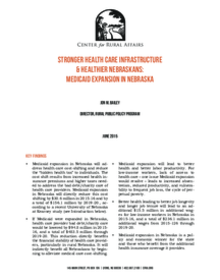On April 1, 2015, Dr. Allan Jenkins, Professor of Economics at the University of Nebraska at Kearney, and Dr. Ron Konecny, Professor of Management at the University of Nebraska at Kearney, released "Nebraska Medicaid Expansion: Protecting a Critical Infrastructure, Supporting Main Street, Improving Worker Health and Productivity" (henceforth referred to as the “UNK Report”). The UNK Report is an extensive benefit-cost analysis of several factors that should be considered in the debate on LB 472, the Medicaid Redesign Act, and Medicaid expansion in Nebraska.
This brief is part of a series to examine findings of the UNK Report, their implication on LB 472, and their significance to rural Nebraska. This brief examines basic economic and income issues for all Nebraskans connected to expanding Medicaid.
Key findings
- Medicaid expansion in Nebraska will address health care cost-shifting and reduce the “hidden health tax” to individuals. The cost shift results from increased health insurance premiums and higher taxes needed to address the bad debt/charity care of health care providers. Medicaid expansion in Nebraska will directly reduce this cost shifting by $30.6 million in 2015-16 and by a total of $156.1 million by 2019-20, according to a recent University of Nebraska at Kearney study (see Introduction below).
- If Medicaid were expanded in Nebraska, health care provider bad debt/charity care would be lowered by $94.8 million in 2015- 16, and a total of $483.5 million through 2019-20. This reduction directly benefits the financial stability of health care providers, particularly in rural Nebraska. It will indirectly benefit all Nebraskans by beginning to alleviate medical care cost-shifting.
- Medicaid expansion will lead to better health and better labor productivity. For low-income workers, lack of access to health care – one issue Medicaid expansion would resolve – leads to increased absenteeism, reduced productivity, and vulnerability to frequent job loss, the cycle of perpetual poverty.
- Better health leading to better job longevity and longer job tenure will lead to an additional $15.5 million in additional wages for low-income workers in Nebraska in 2015-16, and a total of $236.1 million in additional wages from 2015-126 through 2019-20.
- Medicaid expansion in Nebraska is a policy and economic winner for the state and those who benefit from the additional health insurance coverage it provides.


